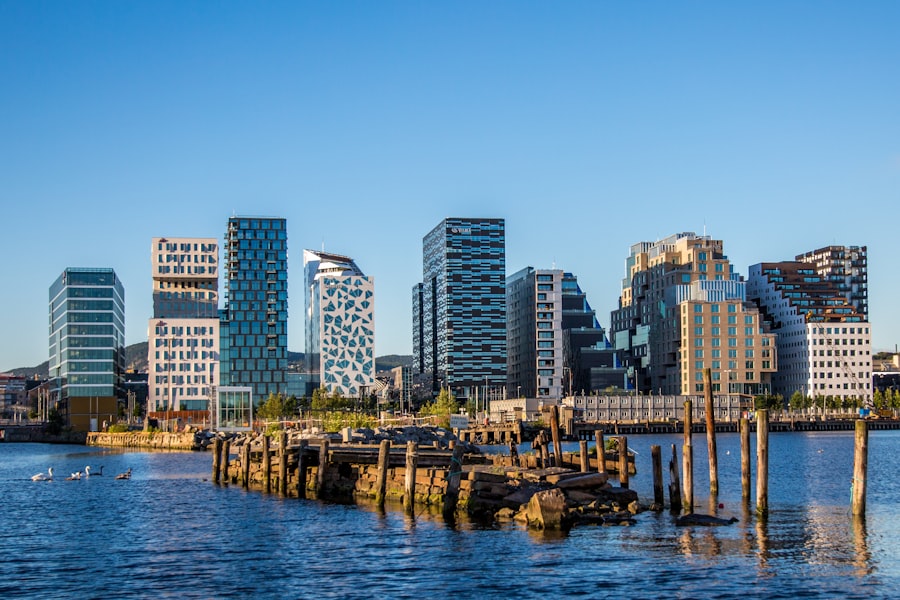Norwegian business culture is characterised by a unique blend of egalitarianism, direct communication, and a strong emphasis on work-life balance. In Norway, hierarchy is often downplayed, and employees at all levels are encouraged to share their opinions and contribute to discussions. This democratic approach fosters a collaborative environment where ideas can flourish, and innovation is encouraged.
Understanding this cultural nuance is essential for foreign businesses looking to establish a foothold in Norway, as it can significantly influence workplace dynamics and decision-making processes. Moreover, punctuality is highly valued in Norwegian society. Arriving on time for meetings and appointments is seen as a sign of respect and professionalism.
This cultural trait extends to business negotiations, where transparency and honesty are paramount. Norwegians prefer straightforward communication, often avoiding excessive formalities or small talk. As such, foreign businesses must adapt their communication styles to align with these cultural expectations, ensuring that they build trust and rapport with their Norwegian counterparts. Take the first step. Book a consultation with the Norway Relocation Group for your move to Norway.
Summary
- Norwegians value punctuality and expect meetings to start and end on time, so it’s important to be prompt and efficient in business dealings.
- Understanding the legal and regulatory requirements in Norway is crucial, as the country has strict rules regarding employment contracts, working hours, and employee rights.
- When looking for office space in Norway, consider factors such as location, accessibility, and the availability of amenities for employees.
- Securing work permits and visas for employees can be a complex process, so it’s important to start early and seek professional advice to navigate the requirements.
- Managing the logistics of the move to Norway, such as shipping belongings and finding accommodation, requires careful planning and coordination.
Navigating the Legal and Regulatory Requirements
Establishing a business in Norway necessitates a thorough understanding of the legal and regulatory landscape. The Norwegian government has implemented various laws and regulations that govern business operations, including company registration, taxation, and employment laws. Foreign entrepreneurs must familiarise themselves with the requirements for registering a business entity, which typically involves submitting necessary documentation to the Brønnøysund Register Centre.
This process can be complex, so seeking legal advice or assistance from local experts can be invaluable. In addition to registration, businesses must also comply with industry-specific regulations that may apply to their operations. For instance, companies in sectors such as finance, healthcare, or construction may face additional scrutiny and licensing requirements.
Understanding these regulations is crucial for avoiding potential legal pitfalls and ensuring smooth operations. Furthermore, staying informed about changes in legislation is essential for maintaining compliance and adapting to the evolving business environment in Norway.
Finding Suitable Office Space in Norway

Selecting the right office space is a critical step for any business looking to establish itself in Norway. The choice of location can significantly impact a company’s visibility, accessibility, and overall success. Major cities like Oslo, Bergen, and Stavanger offer a range of office spaces, from modern co-working environments to traditional office buildings.
Each option comes with its own set of advantages and challenges, so it is essential to assess the specific needs of the business before making a decision. When searching for office space, factors such as proximity to clients, transportation links, and local amenities should be taken into account. Additionally, understanding the local real estate market is vital for negotiating favourable lease terms.
Engaging with local real estate agents who have expertise in the Norwegian market can provide valuable insights and help businesses find suitable premises that align with their operational requirements.
Securing Work Permits and Visas for Employees
For businesses planning to bring employees from abroad to Norway, securing the necessary work permits and visas is a crucial step in the relocation process. The Norwegian immigration system has specific requirements based on the employee’s nationality, job role, and qualifications. EU/EEA citizens enjoy more straightforward access to the Norwegian labour market compared to non-EU/EEA nationals, who may face more stringent regulations.
The application process for work permits can be intricate and time-consuming. Employers must ensure that they provide all required documentation, including proof of employment offers and qualifications. It is advisable for businesses to consult with immigration experts or legal advisors who specialise in Norwegian immigration law to navigate this process effectively.
By doing so, companies can avoid potential delays or complications that could hinder their operations.
Managing the Logistics of the Move
Relocating a business to Norway involves careful planning and management of logistics. This includes not only the physical move of office equipment and supplies but also the transition of employees and their families. A well-structured logistics plan should encompass various aspects such as transportation arrangements, customs clearance for imported goods, and setting up utilities in the new office space.
Additionally, businesses should consider the emotional and psychological aspects of relocation for their employees. Moving to a new country can be daunting, especially for those who may not be familiar with Norwegian culture or language. Providing support during this transition period can help ease the adjustment process and foster a positive work environment from the outset.
Adapting to Norwegian Work Practices

Once established in Norway, businesses must adapt to local work practices to ensure smooth operations and employee satisfaction. The Norwegian work culture places a strong emphasis on work-life balance, with many employees valuing flexible working hours and generous holiday allowances. Understanding these expectations is essential for fostering a positive workplace atmosphere that aligns with local norms.
Moreover, teamwork and collaboration are integral components of Norwegian work practices. Employees are often encouraged to work together on projects and share responsibilities rather than operating in silos. This collaborative approach not only enhances productivity but also contributes to a sense of community within the workplace.
Businesses should promote an inclusive culture that values diverse perspectives and encourages open dialogue among team members.
Establishing a Local Network and Contacts
Building a robust local network is vital for businesses looking to thrive in Norway’s competitive landscape. Establishing connections with other professionals, industry leaders, and local organisations can provide valuable insights into market trends and opportunities for collaboration. Networking events, industry conferences, and business associations are excellent avenues for meeting potential partners and clients.
Additionally, leveraging social media platforms such as LinkedIn can facilitate networking efforts by connecting businesses with relevant stakeholders in their industry. Engaging with local chambers of commerce or trade associations can also provide access to resources and support tailored to foreign businesses operating in Norway. By actively participating in the local business community, companies can enhance their visibility and reputation while fostering relationships that may lead to future opportunities.
Understanding Taxation and Financial Considerations
Navigating the taxation landscape in Norway is essential for businesses operating within the country. The Norwegian tax system is known for its transparency and efficiency; however, it can be complex for foreign entities unfamiliar with local regulations. Businesses must understand their tax obligations concerning corporate tax rates, value-added tax (VAT), payroll taxes, and other financial considerations.
Engaging with local tax advisors or accountants who specialise in Norwegian taxation can help businesses ensure compliance while optimising their tax strategies. Additionally, understanding the implications of double taxation treaties between Norway and other countries can provide significant financial benefits for international businesses operating in multiple jurisdictions.
Providing Support for Employees and their Families
Supporting employees during their transition to Norway is crucial for fostering loyalty and job satisfaction. Businesses should consider offering relocation assistance packages that include help with finding housing, schools for children, language courses, and cultural orientation programmes. Such support not only eases the transition but also demonstrates a commitment to employee well-being.
Furthermore, providing resources for spouses or partners seeking employment opportunities can enhance overall family satisfaction during the relocation process. By addressing the needs of employees’ families, businesses can create a more supportive environment that encourages retention and productivity.
Integrating into the Local Community
Successful integration into the local community is essential for both businesses and their employees. Encouraging participation in community events, volunteering opportunities, or local initiatives can help foster connections between expatriates and locals. This engagement not only enriches employees’ experiences but also enhances the company’s reputation within the community.
Moreover, understanding local customs and traditions can facilitate smoother interactions with residents. Businesses should encourage employees to immerse themselves in Norwegian culture by exploring local cuisine, festivals, and recreational activities. This cultural exchange can lead to stronger relationships with clients and partners while promoting a sense of belonging among expatriate employees.
Ensuring Compliance with Employment and Labour Laws
Compliance with employment and labour laws is paramount for businesses operating in Norway. The country has stringent regulations governing employee rights, working conditions, wages, and benefits. Familiarising oneself with these laws is essential for avoiding legal disputes or penalties that could arise from non-compliance.
Employers must ensure that they adhere to regulations regarding working hours, overtime pay, parental leave policies, and employee health and safety standards. Regular training sessions on labour laws can help keep management informed about their responsibilities while fostering a culture of compliance within the organisation. In conclusion, establishing a business presence in Norway requires careful consideration of various factors ranging from understanding local culture to navigating legal requirements.
For those looking to integrate into Norwegian society effectively while ensuring smooth operations within their organisations, language proficiency plays a crucial role. The NLS Norwegian Language School in Oslo offers comprehensive courses tailored specifically for professionals seeking to enhance their language skills in a business context. By enrolling in these courses, individuals can gain valuable insights into both language nuances and cultural subtleties that will undoubtedly aid them in building successful relationships within the Norwegian business landscape.
Learn more about the Norwegian classes at the NLS Norwegian Language School in Oslo

